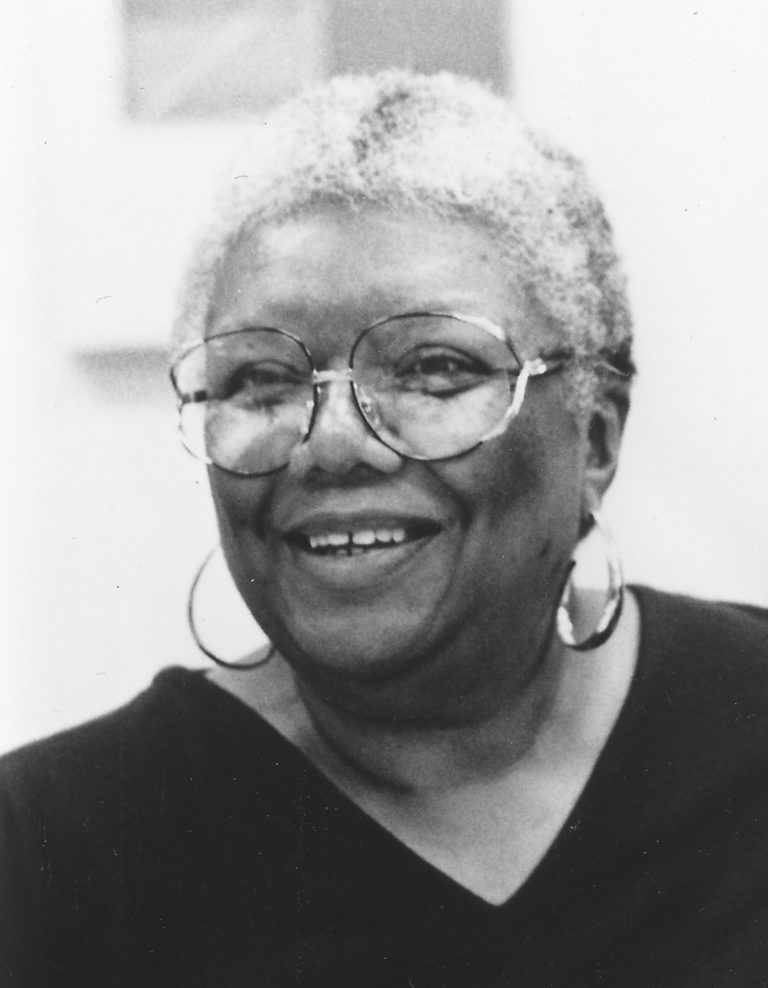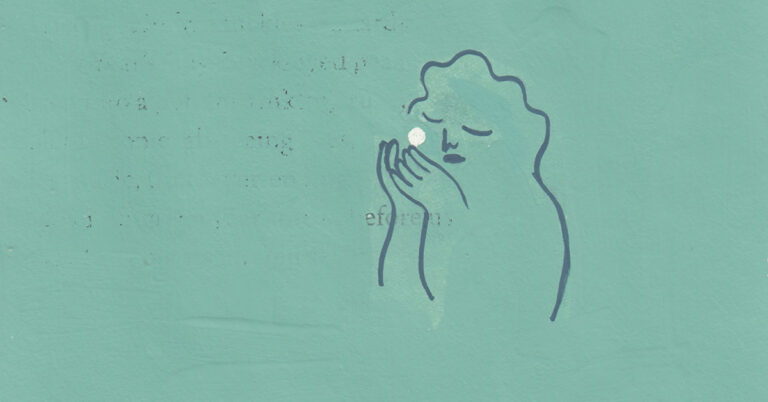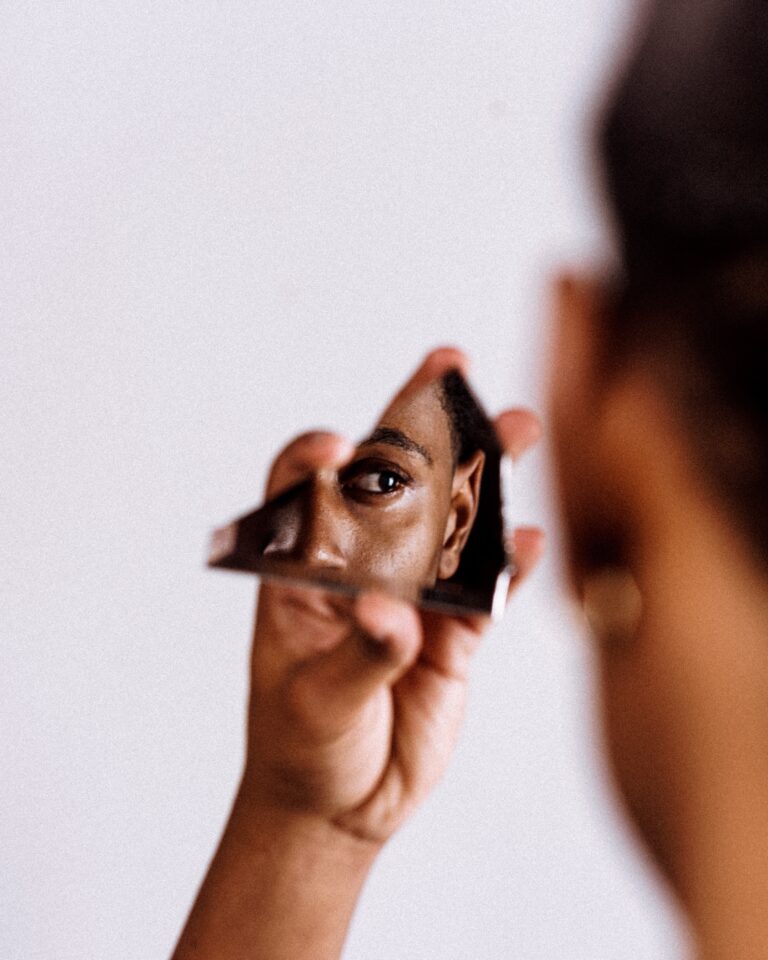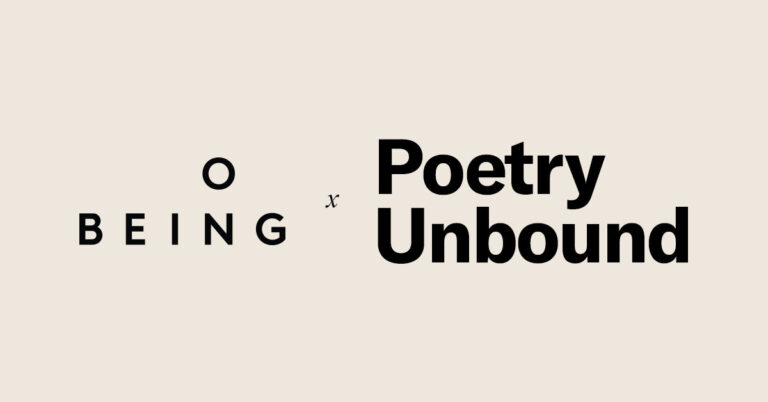Elizabeth Alexander
Words That Shimmer
We’re hungry for fresh ways to tell hard truths and redemptive stories, for language that would elevate and embolden rather than demean and alienate. Elizabeth Alexander shares her sense of what poetry works in us — and in our children — and why it may become more relevant, not less so, in hard and complicated times.
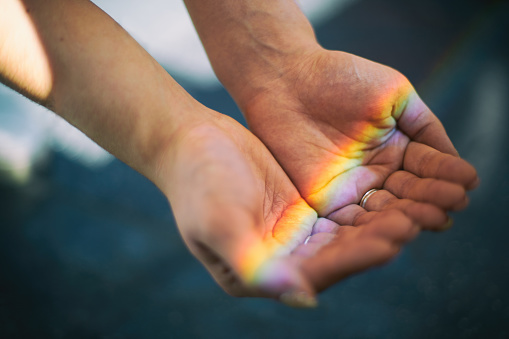
Image by Nico De Pasquale Photography/Getty, © All Rights Reserved.
Guest
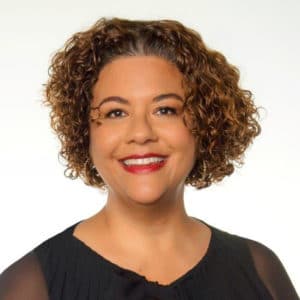
Elizabeth Alexander is a poet, author, and educator. Since 2018, she has served as president of The Andrew W. Mellon Foundation. She was inducted into the American Academy of Arts and Sciences in 2019 and is Chancellor Emeritus of the Academy of American Poets. Her books include American Sublime, a 2006 finalist for the Pulitzer Prize in Poetry and the memoir, The Light of the World, a 2016 finalist for the Pulitzer Prize in Biography. Her most recent book is The Trayvon Generation.
Transcript
July 23, 2015
KRISTA TIPPETT, HOST: Poetry comes up so often in my conversations these days, and in unexpected contexts. It’s something many of us seem to be hungry for, though often without knowing it until we hear it. I think we’re starved for fresh ways to talk about difficult things — for language that would elevate and embolden rather than demean and alienate.
Elizabeth Alexander was the fourth poet in American history to contribute to a U.S. presidential inauguration, the first of Barack Obama in 2009.
Her poem on that day included these lines:
“We encounter each other in words, words
spiny or smooth, whispered or declaimed
words to consider, reconsider.”
[music: “Seven League Boots” by Zoe Keating]
MS. TIPPETT: This hour, Elizabeth Alexander shares her sense of what poetry works in us —and in our children — and why it may become more relevant, not less so, in hard and complicated times.
ELIZABETH ALEXANDER: You know, poetry has always existed, and always existed in a communal context. Part of what people get from that is the story of who I am and who we are. I gotta tell you my story. I gotta tell you what happened. Let’s think about who we are.
MS. TIPPETT: I’m Krista Tippett and this is On Being.
[music: “Seven League Boots” by Zoe Keating]
MS. TIPPETT: Elizabeth Alexander is a Chancellor of the Academy of American Poets and she’s the inaugural Frederick Iseman Professor of Poetry at Yale University. She’s also the author of several books of essays and poetry including Crave Radiance. And she’s just written a beautiful memoir of grief and love, The Light of the World.
I interviewed Elizabeth Alexander in 2010. Her family background, though not linked to poetry, tells a vivid American story. Her extended family was a force in mid-century Harlem culture. She herself grew up in Washington, D.C., where her parents became players in the political dramas of the 1960s.
Her mother is a historian, her father served as secretary of the army, the first African-American to hold this post under Lyndon Johnson. And at the age of one, she was with them at Martin Luther King’s “I Have a Dream” speech near the spot on the Washington Mall where she would one day read a poem of her own creation.
MS. TIPPETT: So when you look back at your childhood now, where do you see the seeds of your life as a poet?
DR. ALEXANDER: I was the proverbial child with the jug ears – I was a listener. I liked almost nothing more than listening to the grown-ups talk. I had one grandfather with whom we spent a great deal of time, who was from Jamaica, and another grandmother who came from Alabama and then Washington, D.C. and then ended up in New York. And my parents are both really, really New Yorkers, and I loved what seemed like my grandfather’s quite specialized vocabulary that sometimes was the same as in the English children’s books that I loved so much…
MS. TIPPETT: Oh.
DR. ALEXANDER: …he would sometimes use the word “chap” and I just thought, who would have thought my Jamaican grandfather and Mary Poppins would have something to say to each other, but they were both actually incredibly formative to me.
MS. TIPPETT: So it doesn’t sound like, from what I’ve read, that you were destined to be a poet. I mean, you were growing up, in fact, in Washington in a very political time and a very political environment although, as you say, there was certainly a literary sensibility and a care for words and language and ideas. But as you became a poet then — a little bit to your surprise — what did you begin to learn in particular about where poetry comes from in you and what it does in the world as a way of speaking and expressing truth?
DR. ALEXANDER: Yeah, I think my becoming a poet was not expected nor preordained or planned in any kind of way. I grew up in a household of very, very smart and well-educated people, but not in a household of poetry readers, in particular. And I think that most of the people who I went to school with — those Washington kids at good schools — became lawyers or got involved in politics or became other kinds of professionals, but not creative professionals. So it was a funny thing. I guess we were always expected to be very, very practical as black children of a particular era.
There was no question, no question whatsoever, about our being serious about school, doing well in school. They didn’t even have to articulate it. You just didn’t mess up. They wouldn’t quite have said people died for you to go to school, [laughs] but it was implicit all the time. So I think in part, I mean, having a Ph.D., becoming a professor, making another kind of professional life that existed alongside the stranger, more mysterious, life of an artist, life of a poet, was the piece that I took from the environment that I grew up in. That you can be an artist, but you’ve got to do something practical alongside it. You’ve got to figure out how you’re gonna take care of yourself in the world.
MS. TIPPETT: Right. So I started to say this before our interview began. One thing I’m aware of in our programs — I mean, poetry comes up more and more in my conversations and, when we put poetry on the air, there’s something so magnetic about that, right? I’m aware of that at the same time that I’m very aware that I think we are experiencing the failure of what you refer to in places as official language and discourse, like arguments and statistics, right?
DR. ALEXANDER: Mm-hmm. Yes.
MS. TIPPETT: And it clearly is not serving us. So, and yet I don’t think people — we necessarily have a collective imagination about what we need instead.
DR. ALEXANDER: Well, yes. I mean, amen to everything that you’ve just said and I think here’s what we crave. We crave truth tellers. We crave real truth. There is so much baloney all the time. The performance of political speech, of speeches you say on the news, doesn’t it often feel to you like there should be a thought bubble over it [laughs] that says what I really would say if I could say it is these people, who I oppose, I don’t like them and I don’t want to work with them because they’re obstructionist, but I have to act like I want to partner with them because that’s the accepted form of discourse, but in fact, it’s not really getting us anywhere. Or how I think of things like on, I don’t know, comedy shows when there’s a little ticker tape underneath that says “she’s lying”. That’s how I experience sometimes that sort of speech as well.
So I think, I learn so much every day from being a mother. My sons are 11 and 12 and you see the way that children — they know when they’re being bamboozled. [laughs]
MS. TIPPETT: Yes, they do.
DR. ALEXANDER: And they also are drawn toward language that shimmers, individuals words with power. They will stop you and ask you to repeat a shimmering word if they’re hearing it for the first time. You can see it in their faces, so I think…
MS. TIPPETT: Can you think of a word that you’re — I have a 12-year-old son also, by the way.
DR. ALEXANDER: OK.
MS. TIPPETT: So can you think of a word? I’m just trying to think of one as I…
DR. ALEXANDER: Well, actually, if they were right here, they would love “hoodwinked” and “bamboozled.”
MS. TIPPETT: Yes. [laughs]
DR. ALEXANDER: I can tell you that. You know, people sometimes ask me when they read poems that have an “I” in them that seems to be autobiographical. People are interested in the details. Oh, did that really happen to you? Is that from you? What I try to explain is, even if I am drawing on personal experience, the truth of a poem is actually much deeper than whether or not something really happened. What matters is an undergirding truth that I think is the power of poetry and I think that, when I veer from that, even by a syllable, it’s my job to know if I’ve veered from that. That’s where the red pencil has to come out.
MS. TIPPETT: As you’re talking, the poem I’m thinking of, but maybe you would have another one in mind, is the “Ars Poetica: I Believe.”
DR. ALEXANDER: Ah, yeah. Would you like me to read that?
MS. TIPPETT: Yes. Which I think is about — one of your poems that is about what poetry is about and it’s got that—
DR. ALEXANDER: It’s got that “I” in it.
MS. TIPPETT: Yeah.
DR. ALEXANDER: So let’s turn to that.
[reading: “Ars Poetica #100: I Believe”]
Poetry, I tell my students,
is idiosyncratic. Poetry
is where we ourselves
(though Sterling Brown said
“Every ‘I’ is a dramatic ‘I'”),
digging in the clam flats
for the shell that snaps,
emptying the proverbial pocketbook.
Poetry is what you find
in the dirt in the corner,
overhear on the bus, God
in the details, the only way
to get from here to there.
Poetry (and now my voice is rising)
is not all love, love, love,
and I’m sorry the dog died.
Poetry (here I hear myself loudest)
is the human voice,
and are we not of interest to each other?
So I think that the truth of that poem is not about true things or things that happened, but rather in the question: are we not of interest to each other?
MS. TIPPETT: Yes.
DR. ALEXANDER: Which to me isn’t about, “oh, I like her shoes,” or “oh, he has a fascinating job.” It’s much deeper than that. Are human beings who are in community, do we call to each other? Do we heed each other? Do we want to know each other? And I think reaching across what can be a huge void between human beings. It’s so amazing that we are each unto ourselves inside of our heads. I look at my children and I think, as deeply as I know you, I do not know what is in your heads, but I crave knowing them that deeply. And so, it’s most intense with one’s beloveds, but I think it’s a way to move in the world. And if we don’t do that with language that’s very, very, very precise — not prissy, but precise, then are we knowing each other truly?
MS. TIPPETT: And I think, for our public life right now, these are really difficult and burning questions, right? It’s a really pointed question right now.
DR. ALEXANDER: Mm-hmm.
MS. TIPPETT: It’s almost impossible — I mean, that question are we not of interest to each other is drowned and destroyed by the forms we have, by the way we talk and the way we’ve postured. But I wonder if you think that poetry for all of us actually gives us a way to point at those interior spaces that would reawaken, as you say, this essential interest in each other which makes new futures possible.
DR. ALEXANDER: Well, I think that it does. In high school I went to a Quaker high school in Washington, Sidwell Friends School, and we had meeting for worship once a week. It was, I don’t know, 45 minutes or something like that, of sitting together in silence and, when moved to speak, people would speak. It didn’t happen very often. And then around graduation, everyone would get up and cry and that was the speaking.
MS. TIPPETT: Right.
DR. ALEXANDER: And there was always one teacher who spoke and, as slightly cynical teenagers, we weren’t going to speak. But nonetheless, the quiet was very important. I even understood that then. But more importantly, the perhaps three minutes of silence with which we began the day, I cherished that then. That overrode all teenage restless silliness. I knew that that moment of inner listening would have analogs throughout the day, if you know what I mean.
That sort of chunk — and right now you can’t see me because we’re on the radio, but I’m holding my fingers together in a little rectangle. So that chunk, that smaller than a brick-sized chunk of contemplative silence with which to simply listen and take stock, would be something that I would need to call on throughout the day. I think that’s a very, very important way to be able to go through life. And I think that poetry can provide those kinds of chunks.
Right before the inaugural, the day before, there was a sound check and the sound guy asked me to — the microphone, oh, my goodness — just this amazing instrument, this finely calibrated kind of Hope diamond of microphones — so he said, “Okay, why don’t you say some poetry?” That was his phrase, “say some poetry” [laughs] “so we can see how it works on the mic.” And the day before, Washington was full of people. People were already coming to the inaugural and the mall was quite full with lots of folks, and it was just me up on the stage and no one was looking at me. I recited one of my favorite poems, Gwendolyn Brooks’ “Kitchenette Building” which starts out:
We are things of dry hours and the involuntary plan,
Grayed in, and gray. “Dream” makes a giddy sound, not strong
Like “rent,” “feeding a wife,” “satisfying a man.”
And then I continued with the poem which asks about could a dream rise up through onion fumes and yesterday’s garbage ripening in the halls? It’s an extraordinary, beautiful, tiny, tiny sonnet. And let me tell you, hundreds of people literally stopped in their tracks to hear this unknown to them person recite a poem by someone unknown no doubt to most of them. And these hundreds of people, I watched them sort of gather in a darkening sort of cluster and then, when the poem was over, they clapped. In other words, they knew it was something about the form of the poem, right? I didn’t say who I was, or what I was doing, or ask for their attention. The poem asked for their attention inherently.
And the poem is about people in Chicago. She’s describing poor people in the 1940s living in these kitchenette apartments under really difficult circumstances trying to find a way to imagine something else, something beautiful. It’s about a very important topic that transcends time and space. You know, how can the imagination and the spirit lift us above our quotidian difficulties.
[music: “Obsidian Flow” by Darcy James Argue’s Secret Society]
MS. TIPPETT: You can read that Gwendolyn Brooks’ poem, “Kitchenette Building” at onbeing.org. I’m Krista Tippett, and this is On Being.
Today, with poet Elizabeth Alexander. Here she is reading the final stanzas of her poem, “Praise Song for the Day,” at the inauguration of Barack Obama on January 20th, 2009.
[reading: Elizabeth Alexander reads the inaugural poem, “Praise Song for the Day,” at Barack Obama’s inauguration]
“…What if the mightiest word is love?
Love beyond marital, filial, national,
love that casts a widening pool of light,
love with no need to pre-empt grievance.
In today’s sharp sparkle, this winter air,
anything can be made, any sentence begun.
On the brink, on the brim, on the cusp,
praise song for walking forward in that light.”
MS. TIPPETT: So, you know, one thing that you did in that inaugural poem, “Praise Song for the Day,” I just want to get it out here in front of me. Having said a minute ago in the “Ars Poetica” that “poetry is not about love, love, love…”
DR. ALEXANDER: This poem is.
MS. TIPPETT: You invoked love into a political moment, into a public space. It’s hard for me to imagine that could have been done politically and have any integrity.
DR. ALEXANDER: Yes.
MS. TIPPETT: But it had incredible weight and also I think strangeness. It was so out of place and yet so powerful, and it worked. So what is the effect of putting that word out there? These have been hard years, these years since the inauguration, with all kinds of pressing problems where to talk about love would almost seem even more superfluous than it might have on that day.
DR. ALEXANDER: Yes. Well, when I say “poetry is not all love, love, love,” I mean romantic love is where we go first with the word. But really there is so much more to the word. The word is sober. The word is grave. The word is not just about something light and happy and pleasurable. The word calls up deep, deep responsibilities.
MS. TIPPETT: The question you posed is what if the mightiest word is love?
DR. ALEXANDER: And that’s a real question and I think, in a lot of my poems, I was thinking about this as I was coming towards this interview. I was thinking about the act of asking real questions in poems as a kind of spiritual practice. I ask questions relatively often in poems and I ask them because I don’t know the answer. And I ask them because I think that poems are fantastic spaces with which to arrive at real conundrum-y kinds of questions, to go as far down the road as you can of understanding something and then sometimes that road ends with a real question.
So “what if the mightiest word is love?” is — it’s a question of fact that perhaps asks in these times, as an incredibly heterogeneous collective, as an incredibly diverse country, is there such a thing as a love that can supersede or guide or take us through disagreement? What would that mean? What would that love look like? Mighty, that’s a very, very particular kind of word. Is there a kind of enduring power of love as I so fervently want to believe, but then I think, once again, love with no need to preempt grievance, love that is not about marital love, it’s not just about familial love. It’s not even about national love. In fact, love cannot just be for the people in our nation, even though right now we’re having this incredible national moment — when I say now, in the moment of the inaugural.
MS. TIPPETT: I think you’re injecting the word “love” into our encounter with otherness, which is more and more just a defining fact even of our national life, right? Even of our family life. I mean, something I think about a lot is how the word that we took after the 1960s to live together with otherness was tolerance, and it’s not nearly a large and mighty enough word, but love is a much more demanding word.
DR. ALEXANDER: Yes.
MS. TIPPETT: It demands much more.
DR. ALEXANDER: Well, yes, and especially if it’s a love with no need to preempt grievance. You know, love that can even do more than tolerate dissent in difference, right? I mean, that can sit with it, can take it in, can listen to it, can let it stand whole, can not necessarily feel the need to engage it argumentatively.
MS. TIPPETT: Right.
DR. ALEXANDER: There are a lot of ways, I think, that people who are aggrieved can be addressed. We all have our grievances and, again, this I think we understand on the intimate level. When grievance is really heard on the intimate level, I think that does a great deal of the work of moving people forward.
MS. TIPPETT: To living together even if the problem isn’t solved, right?
DR. ALEXANDER: Mm-hmm, that’s right.
MS. TIPPETT: So something that I’m really interested in is this the connection between what is universal and what is particular and how what is particular illuminates the universal. So recently I had a conversation with the Chief Rabbi of Great Britain who said this striking thing that he thinks moral imagination begins with universality and ends with particularity, which is kind of the reverse of how we’ve come to think of it maybe superficially of diversity in Western culture, is that the goal, is to get to a place where we realize how alike we are, right? Where we can celebrate what we have in common.
DR. ALEXANDER: Yeah.
MS. TIPPETT: But you’re very much about — you use the phrases like “Negro esoteric quirks, oddnesses, particularities,” that your poems archive and preserve. So how do you think about why it matters what the force is of bringing these very particular, this black experience, to our common life? I’m not sure I’m asking the question right, but maybe you get what — you understand what I’m getting at.
DR. ALEXANDER: Well, I have a bunch of responses, though, yeah. I mean, we are always speaking out of our particular and that was true in ancient Greece and that’s true in England and that’s true in all kinds of languages and that’s true for white people and that’s true for everybody. We speak out of what we know and what we have lived. And then, hopefully from that comes something that we might call the universal. But I also think that because our education is not integrated enough and, by this, I don’t just mean with African American materials, but I mean with really, really a deep and wide range of cultural approaches to what’s important, right?
MS. TIPPETT: Mm-hmm.
DR. ALEXANDER: Even though it’s certainly come a long way from when I was a kid, I think that that’s part of why people still look at — they don’t realize that African American experience is one way of telling the American story and that, in fact, actually it’s a profoundly centered way of telling the American story and, in fact, if you don’t get it and if you move around it in some way, if you don’t pass through it, I think people will profoundly misunderstand America. So I think — and this speaks more in a way to my educator self because, my poet self, she’s all intuition. There’s no program. She’s just, you know, doing as Adrienne Rich says, “diving into the wreck.” Her job, again, to quote that great poem from Rich, she says, “I want the wreck itself, not the story of the wreck, I want the wreck itself.” That’s what you’re supposed to be doing as a poet.
So that’s what that part of me is doing, but the educator part of me argues much more forcefully for the necessary centering of African American culture and experience if one is thinking about the United States.
MS. TIPPETT: Well, yeah, the American story, but also the human story.
DR. ALEXANDER: For sure. Absolutely, absolutely, absolutely.
[music:“Brother Runnin” by Los Hombres Calientes]
MS. TIPPETT: All the poems you’ve heard so far — including “Ars Poetica/I Believe” and others coming up — are available at onbeing.org. When you go to this show’s website, look for all eight poems Elizabeth Alexander recited during our 90-minute interview. Read the texts and download mp3s of her reading them for free. Share them and this show with your friends and family.
And, we’re always looking for fresh, unexpected voices to contribute to our blog. If you write poetry or essays, produce multimedia features or photographs, become a guest contributor. Find the “submission” link on our home page, onbeing.org, and through our email updates.
Coming up, the relevance of poetry in hard economic times; and Elizabeth Alexander’s poetic musings on how childbirth is like jazz.
I’m Krista Tippett. On Being continues in a moment.
[music:“Brother Runnin” by Los Hombres Calientes]
MS. TIPPETT: I’m Krista Tippett and this is On Being. Today, my 2010 conversation with Elizabeth Alexander, a poet and a scholar of African American history and culture. We’re discussing where the hunger for poetry comes from in human life. And we’re exploring the role poetry might play in nourishing our common life, in giving us fresh ways to talk to each other about difficult things.
MS. TIPPETT: I drove in knowing this morning that I was gonna interview you and I was just depressed, as I tend to be these days, by just hearing about what’s going on with the economy, right?
DR. ALEXANDER: Mm-hmm, yeah.
MS. TIPPETT: So it was easier for me a few years ago when the big headlines were all about violence. It was easy for me to say that’s not the whole human story, that’s not the whole truth of humanity. It’s not the whole truth of religion. It’s a piece of the narrative and we have to train our eyes to see the rest. But when the problems as they are right now on a global scale are economic, when it’s about whether people can eat, right?
DR. ALEXANDER: Yeah.
MS. TIPPETT: Whether they can buy winter coats for their children, then I wonder if it’s even a luxury to say that we train our eyes. I wonder if it’s a luxury to talk about poetry. A minute ago, though, when you were telling that story about before the inauguration and the sound check, and you read those lines from Gwendolyn Brooks, what was that again? “Can a dream rise up?”
DR. ALEXANDER: Yeah.
“But could a dream rise up through onion fumes
… And yesterday’s garbage ripening in the hall,
Fight to sing an aria down these halls,
…And would we let it in … and keep it very clean,
Anticipate a message, let it begin?”
So then that’s the next question. And maybe Brooks has been very important to me and maybe this business of poems asking real questions is perhaps something I kind of imbibed unknowingly from Brooks. Because could a dream rise up through onion fumes? Deep question number one with no answer.
But then the next deep question, what would we do with it? Would we take care of it? Would we keep it very clean? What does it mean for us to nurture that piece of ourselves and each other in the midst of the day to day exigencies of, in her words again, “rent,” “feeding a wife,” “satisfying a man?” What place do dreams have in all of that? What do we do with that — do we keep our dreams inextinguishable? How do we feed that part of ourselves and each other? That’s what she’s asking and that’s a very powerful question to me.
MS. TIPPETT: Mm-hmm.
DR. ALEXANDER: That’s a very powerful question. So is poetry a luxury? Well, Audre Lorde’s famous essay, “Poetry Is Not A Luxury,” I would side with that. I think that one of the great things about poetry, and many poets — and many black women poets have written about this — that human beings have always made song. Communities, tribes, peoples, have always told each other the story of who they are in song. And I use the word song to be roughly analogous with poetry because it’s not just words on the page. We’re always aspiring to song when we write poems. Otherwise — we don’t want them to lie dead and flat. We want those words to lift up, and we want them also to live in the body in the way that song lives in the body and lifts you up and fills you with a real quantity when you’re singing. There’s a thing in you when you sing a song.
And so poetry has always existed and always existed in a communal context. So I feel like, well, people must need it because people always did it and never stopped doing it and that part of what people get from that is the story of who I am and who we are. I gotta tell you my story. I gotta tell you what happened. Let’s think about who we are.
MS. TIPPETT: And I think that also gets at why — and maybe I’m just speaking for myself, but in poetry, it’s like that word love. It’s more exacting.
DR. ALEXANDER: Mm-hmm.
MS. TIPPETT: A lot of educated Americans maybe get their only doses of poetry through those pages they may or may not dwell on in The New Yorker, right?
DR. ALEXANDER: Yes. Well, yeah.
MS. TIPPETT: But here’s the thing. You have to be vulnerable to take poetry in you. You either have to be — I mean, it can hurt like beautiful music can hurt.
DR. ALEXANDER: Yes, yes.
MS. TIPPETT: Maybe that’s the embodied part of it that they’re saying. I’ve seen for myself that I have to feel either strong enough or destroyed enough to take in poetry.
DR. ALEXANDER: That’s a beautiful way of putting it. I think Toni Morrison is one novelist who I think of as — she’s as good as a poet. I mean, I think that there’s something so just incredibly distilled in her novels that reading them affects me in the same way that reading poems affects me, just almost as a physical experience. And I remember, for years, I didn’t read Beloved because I just thought, I just can’t take it actually, just can’t take it, gotta wait ’til I can take it. And that when I read it, I read it in very, very small pieces, like a long book of poems actually. You know, just sort of chunk by chunk because it had that dual effect that you’re talking about and that kind of very, very, very visceral power.
So I think poetry — what I also like to continue what a number of writers — Lucille Clifton, Wanda Coleman — they’ve talked about poetry as an art form that is a poor peoples’ art form, which is to say you don’t need — you can’t write a novel without a lot of time to yourself. They don’t get written any other way. But I love how these women talk about how you can snatch time to make a poem. That doesn’t mean that they aren’t hard to make, but it means that they are like grass or flowers coming up in the sidewalk cracks.
Wanda Coleman says, “I can start a poem if I’m waiting on line. Poor people spend a lot of time waiting on line. I couldn’t write a novel waiting on line, but I could start a poem waiting on line.”
Lucille Clifton says, “The best conditions for me to write poetry are at the kitchen table — one kid’s got the measles, another two kids are smacking each other.” You know, life is going on around me. And not only is that the stuff of the poems, but also that she can snatch little tiny snippets of space for the poems. She had six children and she was very, very funny. She said, “why do you think my poems are so short?” [laughs] Because that’s what results when you’re grabbing time like that. But, I mean, they are incredibly, powerfully meditative, amazing, amazing poems. So I think that there’s a way that poetry — you don’t make any money from writing it and you don’t need any money to make it.
[music: “Take Me There” by Pat Metheny Group]
MS. TIPPETT: I’m Krista Tippett, and this is On Being. Today, I’m with poet Elizabeth Alexander. The poem she wrote for the 2009 presidential inauguration was published in a collection, titled Crave Radiance. This volume includes poems from her early celebrated The Venus Hottentot and successive works. It spans themes from the history of slavery to her personal history of becoming a mother.
MS. TIPPETT: There’s some place where you it’s another interview where you quote a feminist colleague who said if Descartes had been a woman, he wouldn’t have said, “I think, therefore I am.”
DR. ALEXANDER: That’s right. Yeah. Her question was, “What if Descartes could get pregnant? How would that have changed the western canon?”
MS. TIPPETT: And tell me how being a mother then changed you as a poet.
DR. ALEXANDER: Well, I think that, first of all, it grew me right up. I think that the image of the writer with just hours and hours and hours of unbroken time and the perfect space and the perfect view out the window and the perfect flowers on the table and the perfect rituals, when you’re raising children…
MS. TIPPETT: It grows all of us up in that way.
DR. ALEXANDER: That’s right. You just realize like, well, if you’re gonna do it, just do it. Don’t even think about doing it. Don’t talk about doing it. Just do it. So actually, it was with my first child and nursing in the middle of the night and being, of course, so tired, but also wonderfully unguarded. I found that actually being that tired was fantastic for my poetry because I had no filters. I’d just have the baby in one arm and it would be three in the morning and I’d write some things down on any scrap of paper. I just grabbed the time I had. I think also when my children were one year apart and in that time my very, very beloved mother-in-law was in the end of her life and actively dying and then died.
And so having those experiences of giving birth and the privilege — she was a very, very deeply spiritual woman and, for me, to be able to see someone have a faith that made her fearless, although she also was a fearless woman who shepherded a large family through times of war, and just a brave woman — for me, it was a privilege to be intimately with her in those years of her life. I think I came to really understand something very deep that served my poetry about the kind of — I’ve called it before, the poorest scrim between life and death and about what it means as a poet to be able to be the person who can sit with those profound, profound, essential human experiences and let them happen and not fight them and learn from them. I never would have thought before that it was a privilege for someone to let you be intimately with them as they moved towards dying, but it was. And I think I understood that because I was having and raising these little babies.
MS. TIPPETT: Would you read the poem, “Giving Birth is Like Jazz”?
DR. ALEXANDER: Oh, “Neonatology,” yes.
MS. TIPPETT: I really love that one.
DR. ALEXANDER: Do you want me to read the whole thing? I could read the — so it’s a poem over many sections. Yeah, I see. This is the conclusion.
MS. TIPPETT: I was looking at page 153.
DR. ALEXANDER: Yes, absolutely. So this is the last poem of a long poem called “Neonatology”.
[reading: excerpt from “Neonatology”]
Giving birth is like jazz, something from silence,
then all of it. Long, elegant boats,
blood-boiling sunshine, human cargo,
a handmade kite —
Postpartum.
No longer a celebrity, pregnant lady, expectant.
It has happened; you are here,
each dram you drain a step away
from flushed and floating, lush and curled.
Now you are the pink one, the movie star.
It has happened. You are here,
and you sing, mewl, holler, peep,
swallow the light and bubble it back,
shine, contain multitudes, gleam. You
are the new one, the movie star,
and birth is like jazz,
from silence and blood, silence
then everything,
jazz.
And if I might, I’d like to put another poem next to that.
MS. TIPPETT: Yes.
DR. ALEXANDER: Which sort of illustrates what I was talking about, about the proximity of those two experiences. This poem is called “Autumn Passage”.
[reading: “Autumn Passage”]
On suffering, which is real.
On the mouth that never closes,
the air that dries the mouth.
On the miraculous dying body,
its greens and purples.
On the beauty of hair itself.
On the dazzling toddler:
“Like eggplant,” he says,
when you say “Vegetable,”
“Chrysanthemum” to “Flower.”
On his grandmother’s suffering, larger
than vanished skyscrapers,
September zucchini,
other things too big. For her glory
that goes along with it,
glory of grown children’s vigil,
communal fealty, glory
of the body that operates
even as it falls apart, the body
that can no longer even make fever
but nonetheless burns
florid and bright and magnificent
as it dims, as it shrinks,
as it turns to something else.
MS. TIPPETT: I’m so glad you read that too next to the other one.
DR. ALEXANDER: I never put them together, but, of course, they go together, don’t they?
MS. TIPPETT: They do, they absolutely do.
[music: “Sundown for Dali” by Atlantis Quartet]
MS. TIPPETT: Crave Radiance is the title of this collection of new and collected poems of yours. And, I mean, just those words “Crave Radiance” in this sentence, we crave radiance in this austere world. I mean, that in and of itself is an example of something you can say in poetry that is deeper than a fact, right? But is there something in you that grieves how hard it is to see a place for poetry? It was so appropriate on that day of the inauguration, although it was very special to have an occasional poem, right? I mean, what, there have been four in history. Is there something in you that grieves that this space is so much smaller in which that might seem to be appropriate?
DR. ALEXANDER: Well, I guess I could say yes and I would be telling the truth. But I think a deeper truth is that, my goodness, there are a lot of people and places in the world and in this country, so many communities, so many levels of human interactions. So where I live, both kind of, in my head [laughs], and in my virtual and writing life and in my teaching life, I still literally just about every day I get an email or a letter from someone who I wouldn’t necessarily call a poetry person — these are not other poets or people who have followed my work — writing to me about where poetry is in their world, sending me their poems.
A story I’ve told before, but it’s just such an amazing story to me, the head of the United Farm Workers wrote to me and sent me a United Farm Workers flag, which was very meaningful because boycotting grapes when I was growing up, is the first political action I remember taking, the first active protest. But they said in the inaugural poems, thank you for choosing the word “lettuce”. So the line is talking about the people who say it plain that many have died for this day, then saying the names of the dead who brought us here. It talks about the people who picked the cotton and the lettuce. So with that word “lettuce,” they said, you made visible the work of the people who feed the nation, with one word. So I feel it’s a privilege and that’s why I talk about it. For me to see that actually there are ways that poetry and poetic language are connecting — and not just mine — with people all over the place. We just don’t get to hear about it very much.
MS. TIPPETT: We just have a couple more minutes. Is there a poem you’d like to read to finish?
DR. ALEXANDER: Why don’t I read — we’ve been speaking about Lucille Clifton.
MS. TIPPETT: The last poem in “Crave Radiance”?
DR. ALEXANDER: I thought so, sound like a good one.
MS. TIPPETT: I thought so too, but I didn’t…
DR. ALEXANDER: Oh, good. I’m so glad.
MS. TIPPETT: [laughs] …I just decided I would let you make that call. But if you had asked me to, that’s what I would have said as well.
DR. ALEXANDER: Good. Oh, I’m happy to hear that. Well, along with so many others, oh, how I miss Lucille Clifton who died last February. Just a very, very great poet whose reputation, I think, will grow and grow as her work is more studied and talked about and written about and more published too. There’s apparently a lot of unpublished work. And also, just a beautiful, loving, loving woman to so many of us younger poets. So to know her was really to love her, and so I miss her.
And one of the things I learned from her poems — she never talked about this with me. But I learned in her poems, as I mentioned earlier, you know, she has poems where she has a very casual conversation with her unborn grandchild. Then the next poem, she’ll have a casual conversation with her husband who’s been dead for 15 years. She was very fluid through the portals of life and death. She had a very deep kind of ancestral understanding and whatever the word would be that is analogous to ancestral, but that moves us into the future, right? She was just on a continuum in that way and I learned a whole lot from that. So this poem is called “One Week Later in the Strange”.
“One week later in the strange
exhilaration after Lucille’s death
our eyes were bright as we received instructions,
lined up with all we were supposed to do.
Now seers, now grace notes, now anchors, now tellers,
now keepers and spreaders, now wide open arms,
the cold wind of generational shift
blew all around us, stinging our cheeks,
awakening us to the open space
now everywhere surrounding.”
[music: “Most Precious One” by Brian Blade and the Fellowship Band]
MS. TIPPETT: Elizabeth Alexander is a Chancellor of the Academy of American Poets and she’s the inaugural Frederick Iseman Professor of Poetry at Yale University. Her books of poetry include Crave Radiance. And she’s recently written her first memoir, a beautiful book about life in and beyond grief, called The Light of the World.
[music: “Most Precious One” by Brian Blade and the Fellowship Band]
MS. TIPPETT: In the essay, “Poetry Is Not a Luxury,” which Elizabeth Alexander cited earlier, Audre Lorde says that poetry “forms the quality of the light within which we predicate our hopes and dreams toward survival and change, first made into language, then into idea, then into more tangible action.” Read that essay in full at onbeing.org. And while you’re there, you’ll also find all the poems Elizabeth Alexander read this hour — and others we couldn’t include for the sake of time. We’ve posted the poems so you can freely listen, download, and share mp3s of each of them — including “One week later in the strange”, that ode to Lucille Clifton, and “Neonatology.” Find all of this and more at onbeing.org.
[music: “Fertile Field” by Bobby McFerrin]
MS. TIPPETT: On Being is Trent Gilliss, Chris Heagle, Lily Percy, Mariah Helgeson, Nicki Oster, Michelle Keeley, Maia Tarrell, Annie Parsons, and Haleema Shah.
Our major funding partners are:
The Ford Foundation, working with visionaries on the front lines of social change worldwide, at Fordfoundation.org.
The Fetzer Institute, fostering awareness of the power of love and forgiveness to transform our world. Find them at fetzer.org.
Kalliopeia Foundation, contributing to organizations that weave reverence, reciprocity, and resilience into the fabric of modern life.
And, the Osprey Foundation – a catalyst for empowered, healthy, and fulfilled lives.
Our corporate sponsor is Mutual of America.
Since 1945, Americans have turned to Mutual of America to help plan for their retirement and meet their long-term financial objectives. Mutual of America is committed to providing quality products and services to help you build and preserve assets for a financially secure future.
Books & Music
Recommended Reading
The On Being Project is an affiliate partner of Bookshop.org and Amazon.com. Any earnings we receive through these affiliate partnerships go into directly supporting The On Being Project.
















